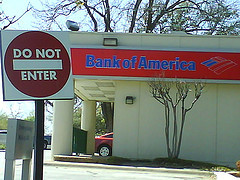Can Bank Of America Argue Its Way Out Of Federal Lawsuit? Image courtesy of (JazzTunes)
The lawsuit accuses Countrywide of removing important controls on mortgage approvals in order to reap cash by selling off $1 billion worth of these bad loans to Freddie Mac and Fannie Mae, both of which were subsequently bailed out by the feds to the tune of more than $140 billion.
Under the False Claims Act, a Civil War-era law prohibits the submission of “false or fraudulent claim for payment” from the government, the feds could seek triple the damages. But given the timing of the scammy Countrywide program and the bailout of Freddie and Fannie, some say BofA might have a case that Countrywide did not violate the FCA.
Wayne State law professor Peter J. Henning writes for DealBook that it is “very much an open question” as to whether or not Countrywide’s deception of Fannie and Freddie constituted the submission of a “claim” to “an officer, employee or agent of the United States.”
Henning explains:
Fannie and Freddie operated as for-profit enterprises until they were put into conservatorship overseen by the Federal Housing Finance Agency in September 2008. While they were “government sponsored enterprises” created by Congress and subject to extensive regulatory oversight, they looked like any other private company with shares listed on the New York Stock Exchange.
The examples of Countrywide’s alleged deception given in the lawsuit are from 2007, which is before Freddie and Fannie went into conservatorship.
And as the Wall Street Journal’s Joe Palazzolo points out, while the 2009 Fraud Enforcement and Recovery Act effectively eliminates such concerns, it appears that FERA can not be applied retroactively in this case.
At that point, one has to go back and see what precedents there are regarding Fannie and Freddie’s position as government instruments. For example, DealBook points to a 1996 U.S. Court of Appeals ruling that, because 13 of the 18 board members at Freddie Mac were elected by shareholders, it was not an arm of the federal government.
“But there are also cases that have found the two companies to be government instruments for determining whether they are subject to state and local taxation or come under federal securities laws,” writes Henning. “The Justice Department is sure to point to these in support of its position that the False Claims Act applies to Fannie and Freddie.”
To make its case, the feds will likely have to prove that even before the bailout, U.S. taxpayers stood to lose from the bad mortgages processed and sold by Countrywide.
“There has to be government skin in the game when the act of fraud is occurring,” attorney Ben Vernia, who represents both defendants and whistleblowers in False Claims Act cases, tells the Journal.
Want more consumer news? Visit our parent organization, Consumer Reports, for the latest on scams, recalls, and other consumer issues.


